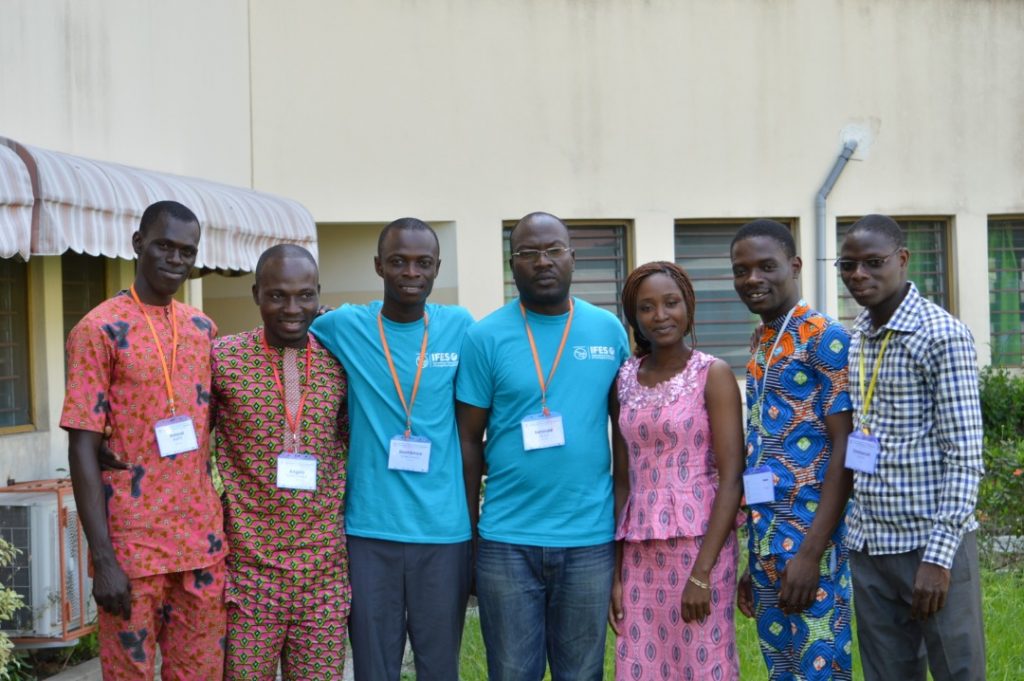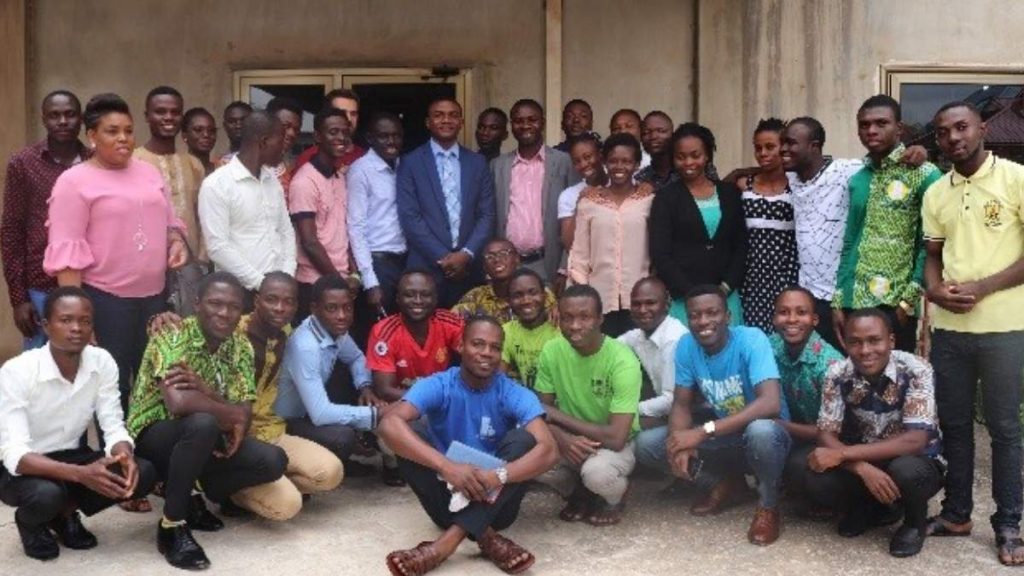
A Look at IFES Publishing
Three Regions, One Life-changing Ministry
‘Book publishing is in the life-blood of IFES ministries’. That was one of the convictions shared at a publishers’ gathering at IFES World Assembly in 2019. Those in attendance understood that putting good books into the right hands can change lives, and the impact can multiply to transform communities.
Many of our 160 national movements have been involved in some way with publishing, and yet it’s an aspect of the fellowship that can slip under the radar. Nonetheless, our calling to reach universities means that IFES operates in institutions that exist for education and research, and students are day by day encountering, absorbing and applying new ideas in their studies. Colin Macpherson, Director of Publisher Development at Langham Partnership, reflects that ‘having a focus on student ministry and the leaders of tomorrow marries very well with a burden for publishing’. We could point to the initial endeavours to establish Inter-Varsity Press UK and USA in the 1940s, or to the fall of the Soviet Union and opening of Eastern bloc countries for ministry in the 1990s, when publishers were desperately needed in the young movements to teach those with little knowledge of Christianity. Publishing is strategic.
IFES-affiliated publishers equip movements with materials they need, bridging student movements and the wider church, and enabling students to approach their issues as mature disciples. Local publishing empowers Christians with contextualised insights, crucial in a global church which has often been dominated by certain voices ringing from thousands of miles away. Macpherson again affirms that ‘when a group of mature believers from the national church feels called to [publishing], it is my experience that they are better able to listen to and discern the needs … and then speak into those needs with contextually important messages’. And IFES can guarantee that the task of creating relevant resources doesn’t rest with national movements working alone, but is supported cross-nationally, and that these resources can be distributed worldwide to students who share cultural or linguistic heritage.
The stories of three particular regions demonstrate this.
Latin America: Certeza UNIDA
Certeza UNIDA had a grassroots beginning in 1959 with the student-led Certeza magazine. Developing into a book-publishing ministry, it was the origin point for the evangelistic Dialogue between Christ and Marx (1967), for instance, by Samuel Escobar, the leading Latin American theologian who later became Honorary IFES President. Now, Certeza UNIDA is the umbrella organisation that links the Spanish-speaking publishers in Latin America, as well as Publicaciones Andamio in Spain. Certeza UNIDA is a platform, for publishing houses associated with Latin American student movements to collaborate on projects for wider circulation in the Spanish-speaking world, or that would be too ambitious for one publisher to work on.
Literature has been vital in the flourishing of the evangelical church in Latin America. To spread the gospel, book stores were opened, colporteurs transported books into mountain regions, and a book van travelled the length of Argentina. In the last decade, they have been focused on the landmark Comentario Bíblico Contemporáneo, published in 2019 as the first single-volume commentary on the whole Bible from Latin American scholars. Gisela Muñoz Cruz, sub-regional coordinator in IFES Latin America, calls it a ‘valuable and strategic work that will doubtless enrich the ministry of the national movements and the church for years to come.’
Certeza UNIDA is adapting to current communication channels by working on social media and ebooks. The core need remains the same, however. Ian Darke, who works with Certeza UNIDA and has been publishing in Latin America since the 1980s, emphasises that ‘it’s important that students and graduates are aware of the tremendous value of written word resources, and also that they don’t appear by magic.’ He suggests that publishing ministries like Certeza UNIDA need more people to invigorate overstretched teams with passion and creativity, that ‘the opportunities to serve are many, both for local Christians or missionaries.’
Certeza UNIDA currently doesn’t have a dedicated online presence. You can, however, explore the websites of three of the publishing houses that form part of Certeza UNIDA – Certeza Argentina, Andamio, based in Spain, and PUMA, based in Peru.
Francophone Africa: Presses Bibliques Africaines
One in four Christians in the world is in Africa – and so the African church needs resources. PBA, a publishing ministry associated with IFES Francophone Africa, began in 1985, originally producing materials for IFES training and other internal purposes. Incredible growth has followed, however, and PBA have since published 130 titles and distributed to every French-speaking country in the world. Their vision is to see French-speaking readers transformed through quality Christian literature, produced by Africans.
Based in Benin, PBA have experienced tremendous success through the struggles of the last two years, publishing at a rate not much altered from before the pandemic. One of the most crucial aspects of the work is the commitment to publish only African authors. Georges Laté, PBA Manager, emphasises that ‘God talks to us in our culture’, and that it is thus essential to write from an African context, using African concepts, ideas and approaches. PBA gives space to African thinking about the Word of God.
As well as receiving manuscripts, the PBA sometimes commission them – identifying a need, finding the relevant work of a theologian, and holding writing workshops. This process has created such works as Du Temple à la Cité (2021), by Augustin Ahoga, or Vivre le grand amour: amour et sexualité des jeunes (2019), by Gad Abel Dideh. The PBA remains rooted in student ministry, and authors are often well-known names within IFES, including general and regional secretaries. The PBA also hold writing and reading workshops for students, who read and debate new titles together.
One of the biggest challenges is that of distribution. There are difficulties selling and transporting books, especially given border closures, and not enough distribution staff. Online markets are only partly helpful, as they are still inaccessible to many, and hard copy production remains critical. One marketing strategy has been ‘Christian Book Day’, promoting a reading culture amongst Christians.
Georges and the team have a visionary focus on growth opportunities, too. The PBA is developing younger authors, training and providing them space to hone their skills. Amazon’s market would give PBA titles a greater reach across different parts of Africa. This is an area in which collaboration across different parts of the IFES fellowship has been key – earlier this year, IFES Logos & Cosmos were able to help PBA make some of their titles available as Kindle editions, accessible to billions far from the reach of a hard copy.
And while the PBA have of course been affected by the pandemic, they are also recognising the opportunities it brings. Georges suggests that the habits of audiences have changed favourably – when people are unable to travel, they have more time to read. Authors from Togo and Gabon are currently writing about COVID, explaining the healing hope of Jesus to the world, through the pandemic, from Africa. The team feel convicted that this was a task given to them as a testimony to non-Christians. They are looking to expand their authorship community to include diasporic Africans, to bring in new contexts and nuances.
Browse titles on the PBA website or Facebook.
Find the following titles as Kindle editions:
MENA: Inspire Publishing House
Five or six years ago, Shaher Luka, a member of the IFES Middle East and North Africa regional team with 25 years of publishing experience, shared a vision for a publishing house to serve the region – an idea that crystalised in 2018 with Inspire. The team identified a need for resources to engage the youth – particularly given the remarkable demographics of the region. Around 60% of the population of the Arab world is under the age of 25 – a striking prospect for the church.
The Inspire Publishing House, based in Egypt, was thus established with three objectives – to encourage the younger generation to write, to encourage Christian authors to write for young people, and to focus on issues that young people care about. Inspire also strongly encourages their authors to write in Arabic, enriching the library of Arabic translations with original material for and from the Arabic-speaking world.
The youth focus has resulted in the publication of Bible studies written by students from Jordan, Egypt, Syria, Lebanon, and Palestine, and a Jordanian graduate has also authored a book discussing Old Testament warfare. Inspire has partnered with Inter-Varsity Press in the UK, and UCCF, the UK national movement, to translate the evangelistic Bible study materials Uncover Luke, John and Mark into Arabic. They have been well-received, and 6000 copies of Luke have been distributed to young people in the region. Inspire also sees fostering relationships with the local church as absolutely key. 500 Arabic copies of Martin Haizmann’s I AM First. Last. Alive. (2019), originally published by SMD, the national movement in Germany, have been given to all church leaders in Egypt.
Inspire has published 10 books, with three currently in the pipeline, despite many struggles since 2018. The greatest has been that Shaher passed away earlier this year. Nonetheless, the Inspire board remain convinced that Inspire is necessary for the church and the national movements, and they are looking for a way forward, hoping to slowly but surely develop their profile in order to resource the whole MENA region.
The vision is big. John 4:35 is a timely verse – ‘Look at the fields! They are ripe for harvest’. Despite the burgeoning youth population, there is no Christian publishing house which focuses solely on young people in MENA – and yet young people have an appetite to read. As in Francophone Africa, the challenges of distribution are some of the most pressing. Hussam Fakhoury, training secretary for MENA and founding board member of Inspire, sees audio books, ebooks, and Amazon distribution in the future.
The team are keen to begin publishing both in English and French, as well as Arabic, and seizing the gap in the market of English Christian books. They are also thinking globally; with 400,000 students from the Persian Gulf studying in the United States alone, Inspire sees important opportunities to distribute Arabic resources to international students. They can thus harness and strengthen the IFES network to reach every student with exactly what they need.
You can reach Inspire on Facebook or Instagram.
Looking Forward
Whether or not you live in these regions, you can stand with these publishers as they work to reach and equip students. Here are five ways to support these ministries, right where you are.
- Pray for IFES movements and publishers to work as God leads them, and to always seek him. Pray through all the situations detailed above.
- Explore and share the work that these IFES publishers are doing with the links provided.
- Read – we want to reach eager potential readers in the broader IFES world.
- Use your network. Do you know someone who could help or who could benefit from one of these ministries? If so, let us know at hello@ifesworld.org, and we’ll connect you.
- Consider whether God could be calling you to use your skills and creativity in Christian publishing, at home or in the wider world.
The student context is characterised by constant new beginnings, and the global scale is as big as it gets. But God is directing the growth of his global church, building connections and experiences and weaving together something amazing from students, publishers, authors, readers, church leaders, and everyone in between. Publishing becomes one key way in which IFES helps students live the vision of Ephesians 4:15: ‘speaking the truth in love, we will grow to become in every respect the mature body of him who is the head, that is, Christ.’




